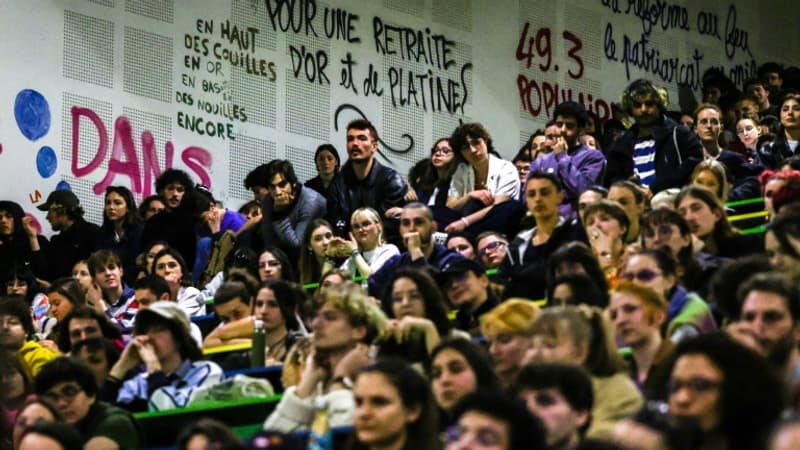“We still expect a lot of people tomorrow,” Imane Oulehadj, president of the French National Union of Students (Unef), said on BFMTV on Monday, a few hours before the tenth day of inter-union mobilization against the pension reform.
The youth must be massively present in the ranks of the protesters. In any case, this is what territorial information offers in a note that BFMTV was able to consult this Monday. According to them, young people will be pushed in particular by the excesses of the past week and Accusations of police violence against protesters.
If the young people were around 30,000 during the last march according to information, their presence this Tuesday should double or even triple.
Establishments blocked and presence in processions
High school students and students must be on the front lines Tuesday morning to lock down their schools: a hundred high schools and universities could be affected, provides territorial intelligence.
Subsequently, these young people must leave with the union marches at the beginning of the afternoon, according to the information.
On Thursday, during the last day of inter-union mobilization, the Ministry of National Education reported “148 incidents” in French secondary schools, including 38 blockages and 70 filter blockages.
The student union L’Alternative has counted some 80 higher education schools and universities mobilized, including some sixty blocked or occupied, in particular in Paris, Clermont, Poitiers, Tours, Strasbourg, Grenoble, Chambery, Toulouse or Versailles.
“Building another society”
According to Unef, the anger has been increasing on the side of the students “since the announcement of 49.3” by the government of Elisabeth Borne. “Let’s not be fooled,” launched Imane Oulehadj, who criticized the government’s statements that the pension reform will benefit young people. “Young people take to the streets to build another, more just society.”
Until then more timid -because the issue of pensions may seem far from their concerns-, the mobilization of young people has strengthened for more than a week.
Stéphane Sirot, historian and sociologist, specialist in social movements, told AFP “a more marked presence of young people, especially students.” “They are getting more involved. This probably marks a turning point, because the issue goes beyond the pension reform itself.”
The president of the largest student union also stressed that the government has delayed the scholarship reform, which would have made it possible to fight against student precariousness. This “pause” in mid-February will be another claim that will be heard in the processions on Tuesday.
Optimal conditions to demonstrate
This Tuesday, secondary school students will be able to benefit from a much more flexible exam schedule than during the first days of mobilization. Many of them took the written specialization tests for the general and technological baccalaureate last week. Now they will have no more trials for June. Enough to free up time for those who wish to go to a demonstration.
In addition, from the meteorological point of view, the return of mild weather in much of the country should be a factor for greater mobilization in the streets among young people.
Source: BFM TV


